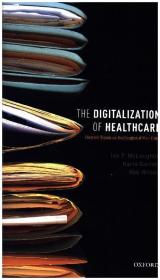 Neuerscheinungen 2017Stand: 2020-02-01 |
Schnellsuche
ISBN/Stichwort/Autor
|
Herderstraße 10
10625 Berlin
Tel.: 030 315 714 16
Fax 030 315 714 14
info@buchspektrum.de |

Karin Garrety, Ian P. McLoughlin, Rob Wilson
(Beteiligte)
The Digitalization of Healthcare
Electronic Records and the Disruption of Moral Orders
2017. 224 S. 241 mm
Verlag/Jahr: OXFORD UNIVERSITY PRESS; OUP OXFORD 2017
ISBN: 0-19-874413-7 (0198744137)
Neue ISBN: 978-0-19-874413-9 (9780198744139)
Preis und Lieferzeit: Bitte klicken
This book explores two controversial examples of attempts to implement national shareable electronic health record systems. It explains why implementing electronic health records has been so fraught with difficulties and argues that the moral basis of recording and sharing health data needs to be re-thought.
Electronic health records are widely regarded as the ´connective tissue´ of any modern healthcare system. For some they represent a ´dangerous enthusiasm´ and for others a key enabler of ´disruptive innovation´. Many governments have made major policy and financial investments in digitalizing health records but their implementation has frequently run into opposition from doctors, had lukewarm responses from patients, and raised considerable concerns for privacyadvocates and others worried by the security of sensitive health data and the risks of national data-bases.This book draws upon the concept of ´orders of worth´ to reveal the moral dimensions of the medical division of labour and to delve deeper into understanding why electronic records have been so difficult to implement and the sources of opposition to them. The authors argue that digitalization disrupts the moral orders which define rights and responsibilities for the sharing and exchanging of patient medical data. This is illustrated through longitudinal studies of two of the most controversialattempts to introduce national systems - a patient controlled electronic record in Australia and a national summary care record that was part of the ill-fated NHS national program for IT in England. The authors conclude by using the lessons from these national experiences and insights from tworegional projects in each country to suggest how the idea of electronic records might be re-thought. It is a must read for anyone concerned about health information and the implications of how it is shared and exchanged in a digital world.
The strength of this book is that it combines the development of theory with the detailed analysis of richly-described case studies. The authors base much of the book around the work of Everett Hughes on moral ordersthat is, in relation to professional practice. The challenges of moral orders in a digitized health service can be understood only on a case by case basis using thick description and narrative analysis. It follows that what the reader will get from this book is an enriched understanding of the complexities of attempting to digitize professional practice. Trish Greenhalgh, Professor of Primary Care Health Sciences, University of Oxford


